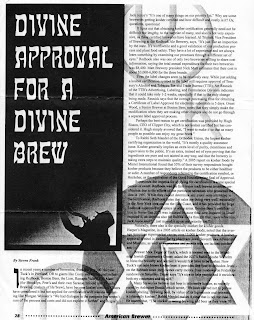It's Passover. And, during these high holy days, God has told the faithful that there will be no drinking of beer.
Foods which are acceptable, that is, Kosher, during most of the year —such as meals of wheat, barley, oats, rye, or spelt that are baked or fermented with yeast— are not permitted during Passover. Beer, therefore, is tref, that is, non-Kosher, for Passover.
And on the fifteenth day of the same month is the feast of unleavened [without yeast] bread unto the Lord; seven days ye shall eat unleavened bread.
—Leviticus 23:6
The good news is, that for the rest of the year, beer can be Kosher.

The ingredients in beer are not unkosher. There is nothing in craft beer (water, hops, barley, yeast) that is not inherently Kosher.
However, that doesn't make beer made with these ingredients Kosher. For instance, they could have been made in the same tanks as some other non-Kosher product and the tanks may not be properly cleaned in between, or perhaps some of the ingredients were in touch with non-Kosher items before getting to the brewery.
Two other esoteric items would make them non-Kosher. One is how the yeast is grown. Redhook, the first major brand to be Kosher certified, had to change the medium in which they grew the yeast. Another is the finings that may be used to clarify the beers. Some of the fish finings come from un-kosher fish which would make the beer unkosher.
Lastly, in a bit of real trivia, for the super-Orthodox, including the chief Askenazi rabbi in Israel, beer has to be made with 'old barley' which is barley that sprouted before the second day of Passover. All Sam Adams beers shipped into Israel are made from old barley.
The bottom line is that it is not Kosher unless it is certified by a Kosher certifying agency. They usually do a pretty thorough check of the purchases, brewery etc... and spot visits one or two times a year. There are a large variety of logos of these agencies and the logo is stamped on the bottle label.
Coors/Molson is/are Kosher, Redhook is Kosher, Sam Adams is Kosher. A host of others too numerous to mention includes a lovely small brewpub in Oregon that doesn't charge Jewish customers for beers on Saturdays because the owner knows they are not supposed to carry money on their Sabbath.
All that aside, Kosher for Passover is a contradiction in terms. Beer is a fermented grain, which is our usual definition. Since fermented grains are not allowed on Passover, beer cannot be Kosher For Passover.
Steve Frank is one-half of the Brews Brothers. With Arnold Meltzer, his work has appeared in the American Brewer, Mid-Atlantic Brewing News, and other periodicals. His explanation, above, of what Kosher beer is (and why no beer is Kosher for Passover) was originally posted on DC-Beer, an on-line group of good beer partisans in the Washington D.C. and Baltimore area.
In 2006, Frank and Meltzer published a much lengthier article on the topic in American Brewer Read it here: Divine Approval for a Divine Brew.

Depending on the particular beer brand, many beers can be certified Kosher (but just not for Passover). Frank and Meltzer wrote that, generally speaking, malted barley and fresh or pelletized hops are not a concern, but things such as hop and malt extracts —and any enzymes, colorings, flavorings, or filters and filtering agents— by nature of the extracting process, might be.
Thus, to be Kosher, a beer's entire brewing process —and ingredient chain— must be specially approved by one of the more than 50 kosher-certifying organizations that exist in the U.S. One such is the Chicago Rabbinical Council. Its website has a list of Kosher and Kosher-approved beers.
By the way, wine, is Kosher for Passover —if strictures are followed. Mazel tov!
-----more-----
- All excerpts are reprinted here with permission from Frank and Meltzer. All rights reserved.
- On a different topic, but appropriate for the season, here are two recipes for vegan (!) Matzoh Ball Soup.
- Via Sayward Rebhal of Bonzai Aphrodite.
- Via Isa Chandra Moskowitzof the Post Punk Kitchen, and author of several vegan-recipe cookbooks, here's a Matzoh Ball Soup cooking video.








No comments:
Post a Comment
Comment here ...